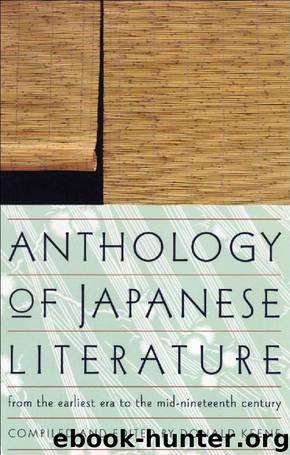Anthology of Japanese Literature: From the Earliest Era to the Mid-Nineteenth Century (UNESCO Collection of Representative Works: European) by Donald Keene

Author:Donald Keene [Keene, Donald]
Language: eng
Format: epub
Publisher: Grove/Atlantic, Inc.
Published: 2007-12-01T05:00:00+00:00
MUROMACHI PERIOD
1333-1600
ESSAYS IN IDLENESS
[Tsurezure-Gusa] by Yoshida Kenkō
“Essays in Idleness” is a collection in 243 sections which range in length from a few lines to three or four pages. It was written about 1340. Yoshida Kenkō (1283-1350) was a celebrated poet and court official of his time, who became a Buddhist monk in 1324. In many ways “Essays in Idleness” seems to echo the delightful “Pillow Book” of Sei Shōnagon, but there is a melancholy tinge to its worldly wisdom which is perhaps due more to the tragic period in which the essays were composed than to Kenko’s religious convictions.
•
To while away the idle hours, seated the livelong day before the inkslab, by jotting down without order or purpose whatever trifling thoughts pass through my mind, verily this is a queer and crazy thing to do!
••
It is desirable to have a knowledge of true literature, of composition and versifying, of wind and string instruments; and it is well, moreover, to be learned in precedent and court ceremonies, so as to be a model for others. One should write not unskilfully in the running hand, be able to sing in a pleasing voice and keep good time to music; and, lastly, a man should not refuse a little wine when it is pressed upon him.
••
However gifted and accomplished a young man may be, if he has no fondness for women, one has a feeling of something lacking, as of a precious wine cup without a bottom. Admire the condition of a lover! Drenched with dews and frosts and aimlessly wandering; ever concerned to shun the world’s reproof and escape his parents’ reproaches; hither and thither pursued by doubt and distress; and spending his nights withal sleepless upon a solitary couch.
But it is well that a man do not become addicted to lewdness, a constant and familiar companion of women.
••
Were we to live on for ever—were the dews of Adashino never to vanish, the smoke on Toribeyama1 never to fade away—then indeed would men not feel the pity of things.
Truly the beauty of life is its uncertainty. Of all living things, none lives so long as man. Consider how the ephemera awaits the fall of evening, and the summer cicada knows neither spring nor autumn. Even a year of life lived peacefully seems long and happy beyond compare; but for such as never weary of this world and are loath to die, a thousand years would pass away like the dream of a single night.
What shall it avail a man to drag out till he becomes decrepit and unsightly a life which some day needs must end? Long life brings many shames. At most before his fortieth year is full, it is seemly for a man to die.
After that age it is pitiful to see how, unashamed of his looks, he loves to thrust himself into the society of others and, cherishing his offspring in the evening of his days, craves to live on and on that he may watch them grow and prosper.
Download
This site does not store any files on its server. We only index and link to content provided by other sites. Please contact the content providers to delete copyright contents if any and email us, we'll remove relevant links or contents immediately.
The Hating Game by Sally Thorne(19217)
The Universe of Us by Lang Leav(15059)
Sad Girls by Lang Leav(14397)
The Lover by Duras Marguerite(7887)
The Rosie Project by Graeme Simsion(6364)
Smoke & Mirrors by Michael Faudet(6180)
Big Little Lies by Liane Moriarty(5781)
The Shadow Of The Wind by Carlos Ruiz Zafón(5680)
The Poppy War by R. F. Kuang(5674)
An Echo of Things to Come by James Islington(4842)
Memories by Lang Leav(4791)
What Alice Forgot by Liane Moriarty(4619)
From Sand and Ash by Amy Harmon(4488)
The Poetry of Pablo Neruda by Pablo Neruda(4087)
The Tattooist of Auschwitz by Heather Morris(3836)
Ficciones by Jorge Luis Borges(3622)
Guild Hunters Novels 1-4 by Nalini Singh(3455)
The Rosie Effect by Graeme Simsion(3454)
THE ONE YOU CANNOT HAVE by Shenoy Preeti(3361)
